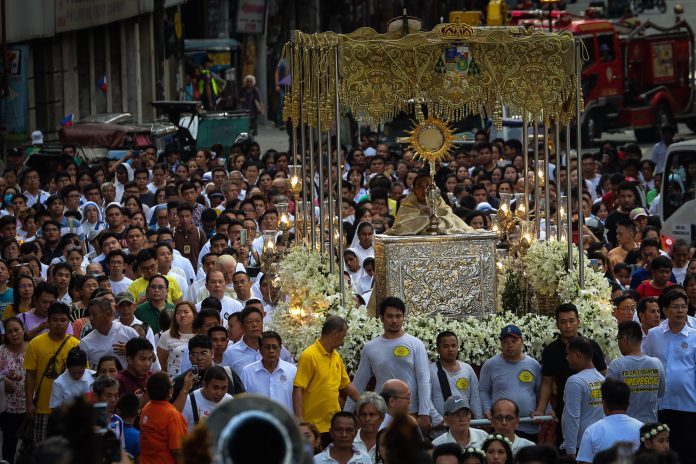On this Sunday, as we reflect on the sacrament of the Body and Blood of Christ, we are reminded of Jesus Christ who sat on a table with the disciples to partake of the sacred meal.
But what makes it sacred compared to other meals that the disciples have eaten? Is it the bread and wine served, or the table set for the people chosen to preach the good news? Or is it the presence of Jesus, who broke the bread and shared the wine among the disciples?
Indeed, Jesus’ presence and actions taken during the meal have made the most ordinary elements of day-to-day life sacred. The Holy Eucharist is a foretaste of God’s holy banquet – where everyone is welcome to be part of the table regardless of the divisions the world has set for all people and the whole of creation.
For this reflection, I devised the acronym REST for us to easily recall the reflections on this feast of the body and blood of Christ:
Christ commands the disciples since old to break bread and share the wine, to remember God’s holy act of redemption not only for humanity but for the whole of creation. Christ’s institution of the Holy Eucharist at the Last Supper provides us with a foretaste of the heavenly banquet – where all are welcomed, embraced, affirmed, and empowered to work for the betterment of the community.
Remembering
Remembering is a sacred act. It is a sacred act to remember and honor our ancestors for their legacy of life bestowed upon their children and grandchildren in the context of our Filipino culture. Food is at the center of these celebrations. The celebrations centered on the table also highlight the timeless narratives of lives lived to sustain the community. It is inevitable for Filipinos to celebrate the legacy of their ancestors and their lives offered to better the state of their own families and the community where they have lived.
In the context of the Eucharist, Christ’s command of breaking bread and sharing wine among fellow believers summarizes the narrative of God’s unchanging love for all created beings. The broken bread and wine outpour serves as a strong reminder of Jesus’ love for the least, the last, and the lost, those who are unwanted and outcasts in society. In the Holy Eucharist, everyone is welcome at the table – Christ urges us to welcome even the stranger and the outcast, dine with them, and express our hospitality and solidarity in their struggles. We can only do the sincere welcome gesture if we possess an open heart like that of Jesus who ministered to everyone regardless of economic, and social status. And in every Holy Eucharist we celebrate, and, in the fellowships, we do in our own home tables, we must remember to welcome and embrace those whose hope is God alone. God’s love embodied in the sacrament of the Holy Eucharist never isolates, nor excludes, but is open for all those who come with sincere hearts.
Encountering
In the celebration of the Holy Eucharist, God utilizes the most mundane of things to share the gift of grace to all. In this way, God uses the most common encounters with people from all walks of life to pave the way for a deeper understanding of grace and the gift of this sacred meal offered in the Holy Eucharist. With those who are engaged in the mission and ministry of the church, we often declare that we bring Christ to the people. We often overlook that God uses encounters, even the most ordinary, to help us realize God’s presence in the world.
Encounters with the children who search for food in the garbage, the youth who are selling food on the streets, the women who sell rags, and the men who do hard labor to build houses, bridges, and roads, their struggle in their everyday life, and their narratives of survival and struggle are narratives that God would want us to listen. Their narratives of both joy and sorrow, triumph and failure, and their stories of perseverance are wellsprings of our faith and on how we should embody Christ as we commit to a sacred encounter with Christ with the poor and the outcast.
Like in the Holy Eucharist, where heaven meets earth, these sacred encounters with people from all walks of life are but sacred moments of encountering Christ who lives among the poor and those who are treated as outcasts by the world’s unjust structures and systems.
Gospel reflection of Klein Fausto Emperado, Youth of the Iglesia Filipina Independiente on the Feast of Corpus Christi
Balik-Tanaw is a group blog of the Promotion of Church People’s Response (PCPR). The Lectionary Gospel reflection is an invitation for meditation, contemplation, and action.









